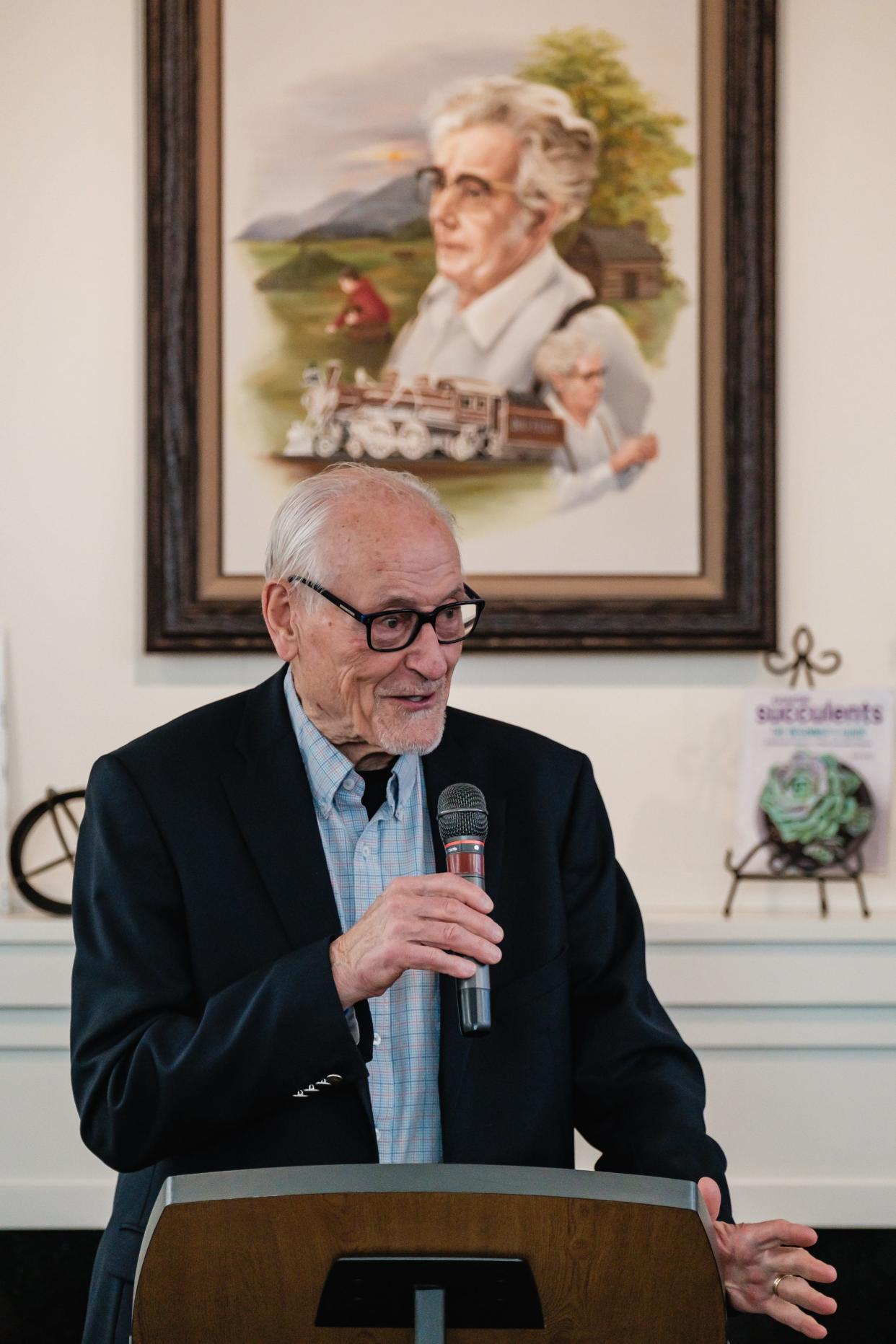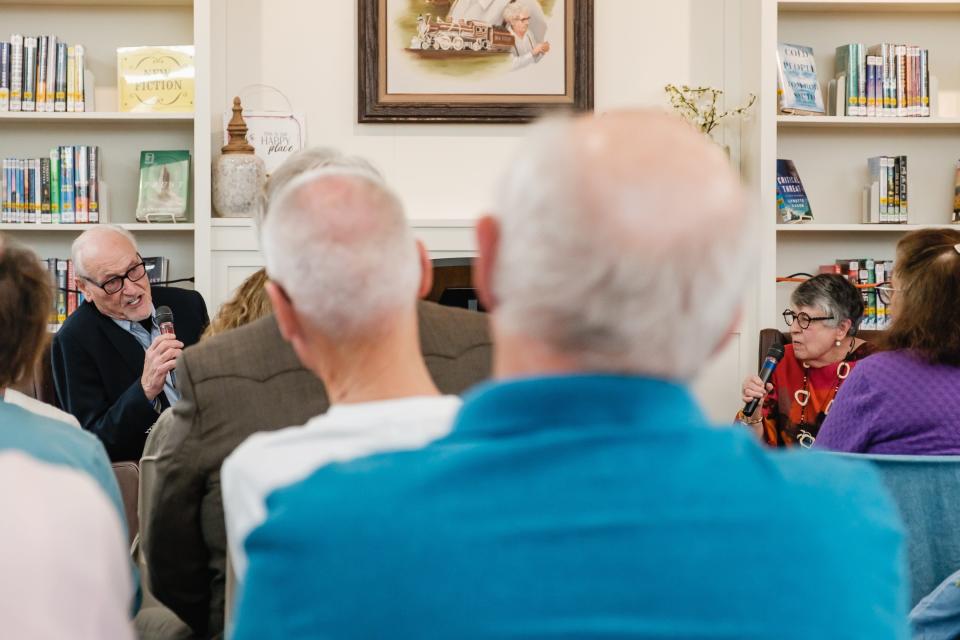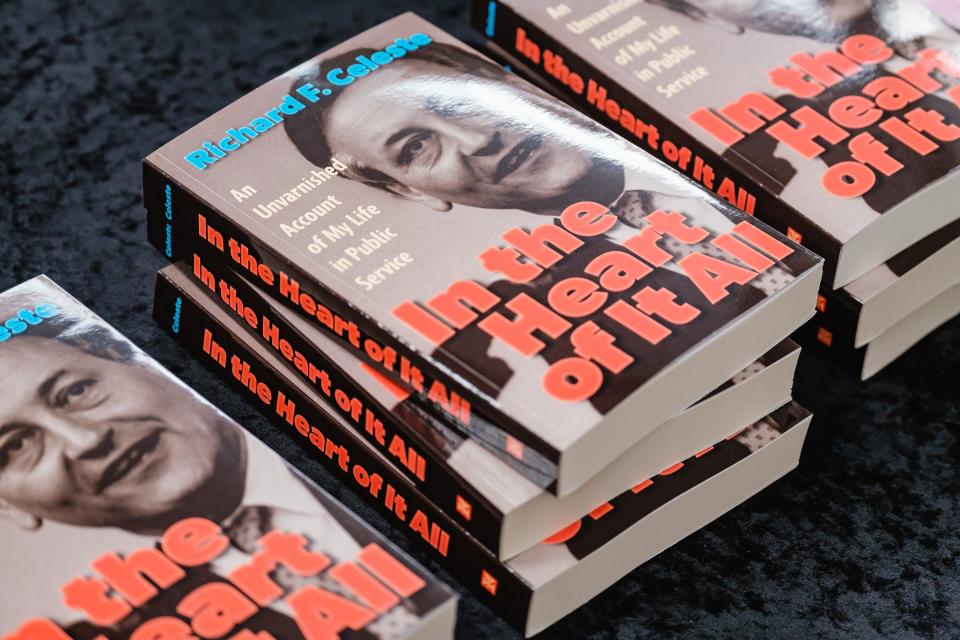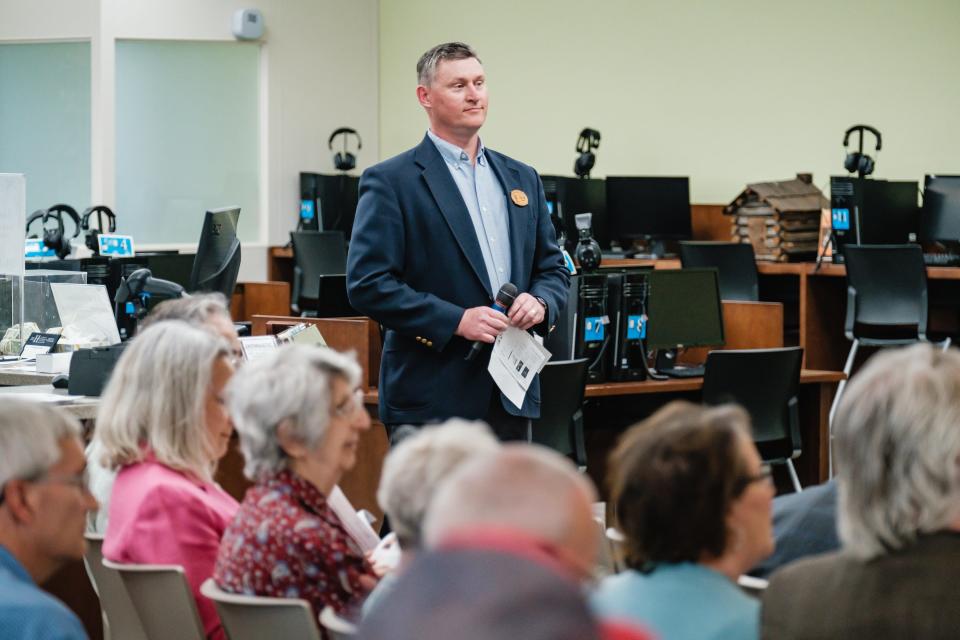Former Ohio Gov. Richard Celeste talks about his life in politics before Dover audience

- Oops!Something went wrong.Please try again later.
DOVER ‒ Former Ohio Gov. Richard Celeste shared stories from his life in government at the Dover Public Library on Saturday evening, covering topics as diverse as his friendship with a Republican counterpart and the harrowing kidnapping of a Peace Corps volunteer.
He spoke briefly about his book "In the Heart of it All: An Unvarnished Account of My Life in Public Service," which chronicles his personal and professional life from his beginnings in Lakewood, Ohio, to Yale, Oxford, Washington, D.C., India, the governor's residence and beyond.
He answered questions from the audience and from New Philadelphia's Joanne Limbach, who was state tax commissioner during Celeste's tenure as governor.
Here are some of the questions from the audience, followed by answers from the man who was the chief executive of state government from 1983 to 1991:
Do you have any resolution for divisiveness in politics?
"The two steps that I would like us to do as quickly as possible would be to eliminate gerrymandering because if we have fair districts, then I think voices will be aiming for the middle, both in congressional races and the state legislative races, and that would be healthy for everyone.
"Ohioans voted to get rid of gerrymandering, but unfortunately put it in the hands of politicians who live in gerrymandered districts. That kind of gerrymandering is part of what's made politics so uncivil and encouraged this kind of wild extremism because if you're in a safe district, the only way you can win is to be more crazy than the other person running."
The Ohio Supreme Court rejected state and federal legislative district maps as being unfair.
"The other thing I'd do would be to require that any kind of political contribution would have to have a personal name on it. There could be no 'dark money,' no organizations that put money in without us knowing who they are. If I don't have to acknowledge what's been said, I might say some things differently. If I have to acknowledge it, I'd be more polite, the way my mother would be happy with me."

Where do we start on stopping gun violence?
"I think we start in Columbus and state capitals across the country. If we have gerrymandered districts where people feel safe no matter what, it's going to be harder to make the change. I don't know that there's a need for civilians to have AR-15s, to have military-style weapons."
Celeste said he now lives in Colorado, an open-carry state which also has a red-flag law permitting a gun to be taken from a person at imminent risk of harming someone.

How did you get Republican former Gov. John Kasich to endorse your book?
After the Republican's parents were killed by a drunken driver in 1987, Celeste invited John and Karen Kasich to spend the upcoming Labor Day weekend at their home. They stayed a week.
Although they disagree about politics, they remain friends and had dinner together Friday.
"He's ... very dismayed about politics as he sees it. He's moved from being a commentator on Fox News to being a commentator on CNN, and now he's a commentator on MSNBC."

Tell us about having to negotiate for the life of a Peace Corps volunteer
Radicals took a volunteer from Ohio who established a child care program for women who sold their produce at a market in San Salvador, El Salvador.
Men of perhaps 16 or 17 years old, carrying military-style weapons, hoped to get money from the city government for the captives' release. They had also taken the female vendors.
The women of the market admonished the captors to avoid harming anyone, and slept at the door of the office to protect the kidnapping victims inside.
After the incident ended, the Peace Corps volunteer wanted to return, but could not go because she would be a celebrity target for kidnappers.
Another volunteer was returned after he was taken hostage in Colombia.
"Those were happy endings to tough stories."
In his role as Peace Corps director, Celeste had to call the families of six or seven volunteers who lost their lives while serving overseas.

What are the similarities in the Silicon Valley Bank failure and Ohio's savings and loan crisis of 1985?
Home State Savings Bank of Cincinnati put too much of its resources into a Florida firm that "played around with federal securities." State rules limited institutions to having 5% of their assets in one place.
"They had almost 20% of their assets in this securities firm in Florida and it went bankrupt."
State examiners found the oversized investment two years in a row, and ordered Home State to unwind the transactions.
"The only way we could force the savings and loan to behave was to get a cease-and-desist order. And to do that, we would have to have a public hearing. And to have a public hearing and explain why we needed a cease-and-desist order, it would be like saying to your depositors, 'Go get your money out of this place as fast as you can.'"
In 1985, Celeste declared a bank holiday to prevent massive withdrawals from 69 other state-chartered institutions.
"In the case of Home State, in one day, they took out $26 million. Silicon Valley Bank, in one day, they took out $42 billion because everything's electronic now."
Federal examiners recognized Silicon Valley Bank's problem, but did not have a way to enforce their recommendation.
"We need scalpels for dealing with these kinds of problems, and not sledgehammers because if you use a sledgehammer you create the problem you are trying to avoid."
Reach Nancy at 330-364-8402 or nancy.molnar@timesreporter.com.
On Twitter: @nmolnarTR
This article originally appeared on The Times-Reporter: Former Ohio Gov. Dick Celeste talks about diverse topics on book tour

